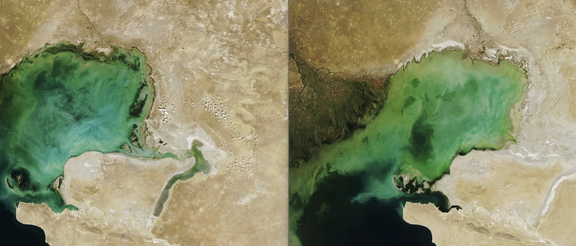Iran warns a quarter of Caspian Sea could dry up in 20 years

Up to a quarter of the Caspian Sea's water levels may dry up within the next 20 years, an Iranian government official has warned.

Up to a quarter of the Caspian Sea's water levels may dry up within the next 20 years, an Iranian government official has warned.
"Our shores have experienced significant retreat, raising concerns that our facilities and ports could be in jeopardy," an Iranian Environmental Protection Organization official, Omid Sedighi, told local media.
"Addressing this issue entails considerable expense, as extensive dredging is required to restore water access to the docks and ports. This poses a substantial threat," he added.
Addressing the challenges faced, Sedighi noted that the country's coastlines have "significantly receded," placing critical infrastructure, such as facilities and ports, at risk. He warned that if the current trend of declining water levels continues, it could lead to the drying up of other wetlands, render docks and ports inaccessible, and create serious issues for coastal power plants. Furthermore, he expressed concern that the situation could also jeopardize shrimp farming operations.
His remarks mirror concerns that Iranian officials have voiced for years. Last year, Iran’s Minister of Interior, Ahmad Vahidi, warned of the Caspian Sea's further decline in the coming decades, while refraining from addressing the regime’s neglect of ecological issues.
Similarly, Ali Salajegheh, head of the Iranian Department of Environment, underscored the ecological challenges posed by a one-meter reduction in the Caspian Sea's water level over the past 4-5 years, noting an average annual decline of 20 centimeters.

However, the predicament transcends Iran's borders. The Caspian Sea is bordered by Iran to the south, Turkmenistan to the southeast, Kazakhstan to the northeast, Russia to the northwest, and Azerbaijan to the southwest.
Scientific studies have revealed that the Caspian Sea's water levels, which have exhibited sharp fluctuations over the past century, have steadily declined since the mid-1990s.
However, since 2005, conditions have deteriorated even further. Russia's Volga River, which constitutes approximately 80 percent of the total water inflow into the Caspian Sea, has been a focal point of blame among the nations concerned with the sea's declining levels.
Earlier this month, expressing deep concern over the "catastrophic" shrinkage of the Caspian Sea, Azerbaijani President Ilham Aliyev discussed the matter with Russian President Vladimir Putin.
Last year, Kazakhstani officials declared a state of emergency in response to the recession of the shoreline, with the Environment Minister attributing the primary causes to “climate change as an exogenous factor” and the upstream “regulation” of rivers that feed into the lake, including the Volga and Ural, both originating in Russia.
According to NASA's Earth Observatory, a study utilizing several models projected that the Caspian Sea's water levels could decline by an additional 8 to 30 meters (26 to 98 feet) by 2100 due to climate change. Moreover, human activities such as water use and diversion could contribute to a further 7 meters (23 feet) of water loss. These projections underscore the significant impact of both natural and anthropogenic factors on the future of the Caspian Sea's water levels.
According to a study published in Nature, "a decline by 9–18 meters will mean that the vast northern Caspian shelf, the Turkmen shelf in the southeast, and all coastal areas in the middle and southern Caspian Sea emerge from under the sea surface. In addition, the Kara-Bogaz-Gol Bay on the eastern margin will be completely desiccated. Overall, the Caspian Sea’s surface area will shrink by 23 percent for a 9 meter and by 34 percent for an 18 meter drop of sea level." Scholar Vali Kaleji emphasizes that to address this critical issue, Caspian coastal nations must prioritize integrated, coordinated, and comprehensive policies and strategies.